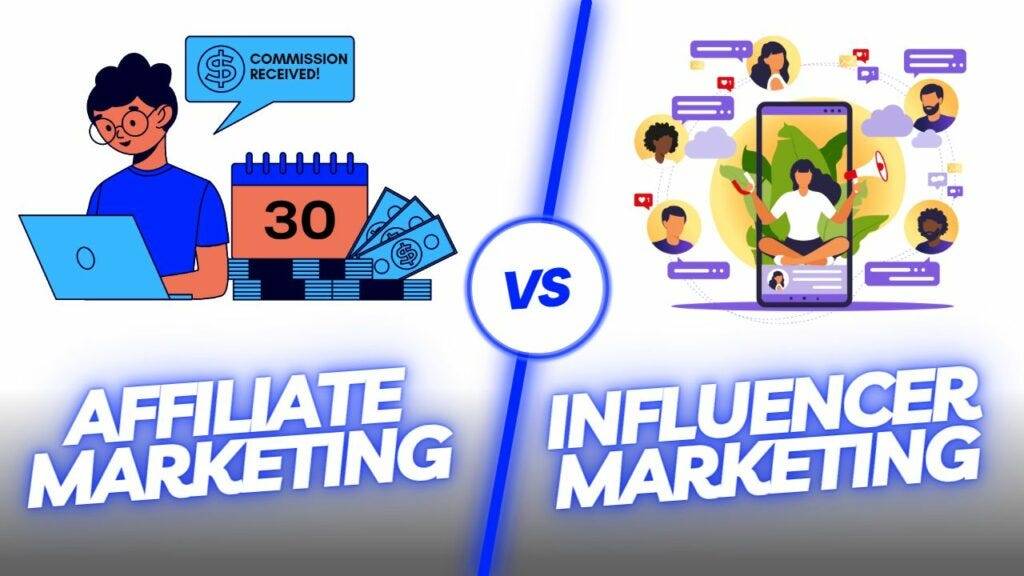In the dynamic landscape of digital marketing, businesses have an array of strategies at their disposal to drive results. Two of the most prominent strategies, affiliate marketing and influencer marketing, often take center stage due to their potential to generate a strong return on investment (ROI).
Many people believe that Affiliate Marketing and Influencer Marketing are the same thing.
To some extent, this is reasonable, given both employ techniques that rely on the reach of online content creators to drive sales and brand awareness. They are, nevertheless, profoundly different on a deeper level. Let’s compare the two, describing definitions, functions, techniques, and the benefits of each.

Affiliate Marketing: ROI in Performance-Based Success
Affiliate marketing is a results-driven strategy that connects brands with marketers, or affiliates, who promote their products or services. The fundamental principle behind affiliate marketing is that you only pay commissions when a sale or specific action is completed, making it a cost-effective way to drive conversions.
Affiliate marketing is quite similar to referral marketing, another performance-based marketing method. The fundamental distinction between the two is that referral marketing relies largely on a company’s existing clients to generate leads or make sales.
The payout scheme used by an affiliate program is its most distinguishing feature. Affiliate partners are only compensated when they provide genuine results, which are typically in the form of sales. As a result, affiliate marketing is seen as a performance-based marketing technique.
What constitutes the Procedure of Affiliate Marketing?
An advertiser (Brand) establishes an affiliate program, defining the terms and conditions of the partnership. This includes commission rates, tracking methods, payment schedules, and guidelines for promotional methods.
Affiliates (Individuals) join the program and access the provided marketing materials. They promote the brand’s offerings using these materials, embedding their unique affiliate links in their content.
When users click on an affiliate’s link and visit the brand’s website, their actions are tracked using cookies or tracking methods. If the user completes a desired action (like making a purchase), it’s recorded as a conversion.
Based on the tracked conversions, the affiliate program calculates the commissions owed to affiliates. After a predetermined time period (say the sale has been verified and not returned), affiliates receive their earned commissions through payment methods specified by each brand.



Click here to learn how SocialPi helps you with Affiliate Marketing.
What is Influencer Marketing?
Influencer marketing is a marketing strategy that involves collaborating with individuals who have a significant and engaged following on social media platforms. These individuals, known as Influencers or Creators, have established credibility and influence within a specific niche or industry.
Brands partner with influencers to promote their products or services to the influencer’s audience, leveraging the influencer’s reach and authenticity to create a more impactful marketing message.
What constitutes the procedure of Influencer Marketing?
Shoutouts: A product is promoted by an influencer in a single or series of postings.
Giveaways: The sponsor provides the influencer with free products to distribute to their followers through a contest or lucky draw. Jumpstart your giveaway journey today, and head to SocialPi for a seamless experience.
Platform takeovers: To increase traffic, the influencer obtains exclusive access to the brand’s social media channel.
Sponsored content: To develop sponsored content such as videos, the brand collaborates closely with the influencer.
Brand ambassador: A long-term agreement in which a celebrity influencer promotes a brand across several media.
Difference between Affiliate Marketing and Influencer Marketing?
- Involves a partnership between brands and affiliates (publishers).
- Affiliates earn commissions for generating sales, leads, or actions.
- Content is direct and focused on showcasing product benefits and promotions.
- Affiliates might have their own audience but not as closely associated as influencers.
- Relationships tend to be more transactional, often for short-term promotions.
- Focuses on conversions, with transparency being essential.
Influencer Marketing:
- Revolves around collaborations between brands and social media influencers.
- Influencers create organic and personalized content that integrates brands naturally.
- Compensation for influencers includes flat fees, products, or a combination.
- Influencers have cultivated a loyal and engaged audience that trusts their recommendations.
- Emphasizes building long-term relationships, leading to deeper brand integration.
- Thrives on authenticity and trustworthiness of influencers, with a focus on influencing opinions.
Both strategies have their unique strengths and cater to different marketing goals. The decision between affiliate marketing and influencer marketing depends on factors such as the desired relationship with promoters, the style of content, the target audience, and the level of personal connection sought with customers.
Which is better: Affiliate Marketing or An Influencer Program?
The decision between affiliate marketing and an influencer program depends on your specific goals, target audience, budget, and the nature of your products or services. Each strategy has its own strengths and considerations. Let’s compare both options to help you make an informed decision:



Affiliate Marketing:
- Pros: Performance-based (pay for conversions), Zero Upfront Costs enables much wider outreach, results-driven and diverse reach.
- Cons: Lesser personal connection.
- Suitable for Direct sales focus, controlled budget, and broad audience reach.
Influencer Program:
- Pros: Authenticity, trust and credibility, engaging content, niche targeting.
- Cons: Upfront costs restrict the number of relationships and variable outcomes.
- Suitable for Building personal connections, brand authenticity, and specific audience targeting.
Choosing the Right Strategy:
Consider your goals, budget, desired audience connection, content style preference, and target demographics. A combined approach might yield optimal results.
Ultimately, the decision between Affiliate Marketing and an Influencer Program should be aligned with your unique circumstances and marketing objectives. Both strategies have their merits, and a thoughtful approach can maximize the benefits of each.







